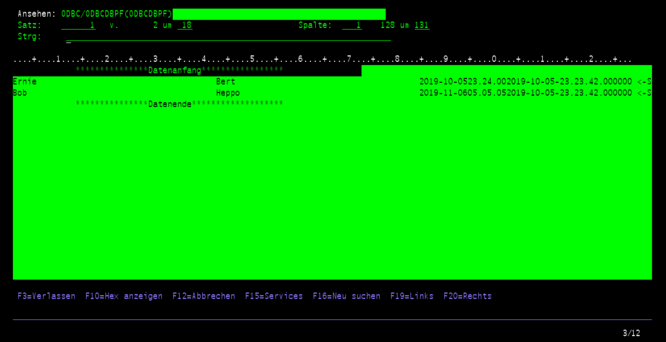User:Heiko
About
This is Heikos personal page, in which he maybe shares some private information or collects bits for new articles.
Personal information
Heiko has been in IT since the 90s, but never worked with an AS/400…until 2019. He'll document his first steps in the hope they will be useful to others.
Ideas for new articles
Project: Access database with ODBC
Accessing a AS/400 via ODBC is something that might come in handy some day, so I decided to explore how it can be done.
Be warned: This is more like a log, showing (and hopefully solving) all issues I ran into doing this. I think this is more helpful than a ideal world example.
Create a database
I suggest you try Beginners Project: 99 Bottles Of Beer (using REXX) and Beginners Project: Hello World (using database, display file and RPG) before you try this![1]
Create a database to play with
- This is the third project Heiko did, so his personal Library was getting a bit cluttered. Therefore, let's create a library just for this niew project:
CRTLIB LIB(ODBC) TEXT(Library for ODBC project source)
CRTSRCPF FILE(ODBC/ODBCDB) RCDLEN(112) TEXT('Project ODBC and Database')to create new physical file to hold the DDS.WRKMBRPDM FILE(ODBC/ODBCDB)Work with this file.F6to create new member, insert member's name and typePF: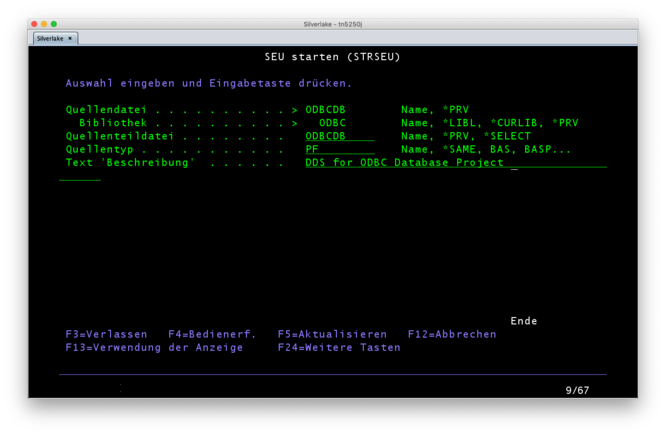
- Enter this DDS: (Learn what the below means Especially time- and dateformats Even more about wibbly-wobbly-timey-wimey-stuff and more)
***************** Datenanfang *******************************************************************************************
0001.00 A R CALLS 191002
0002.00 A CALLER 42A 191002
0003.00 A CALLED 42A 191002
0004.00 A DATE L TIMFMT(*ISO) 191002
0005.00 A TIME T 191002
0006.00 A TIMESTAMP Z 191002
******************Datenende *********************************************************************************************
14to compile…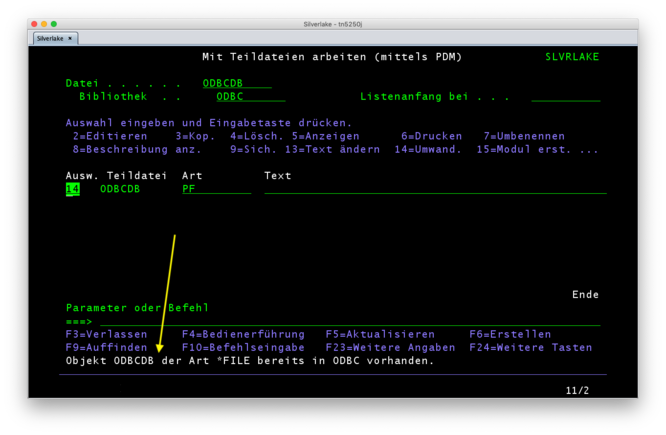
…I failed again. Stupid me. I can't create a new physical database file in the same place, where source physical file (with the same name!) exists.- Just rename the DDS member from
ODBCDBtoODBCDBPF: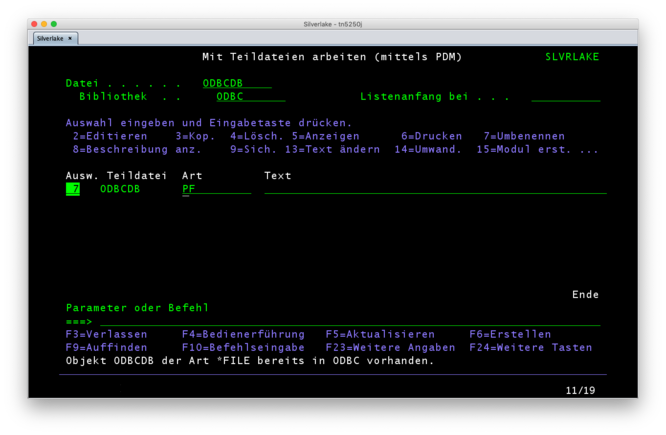
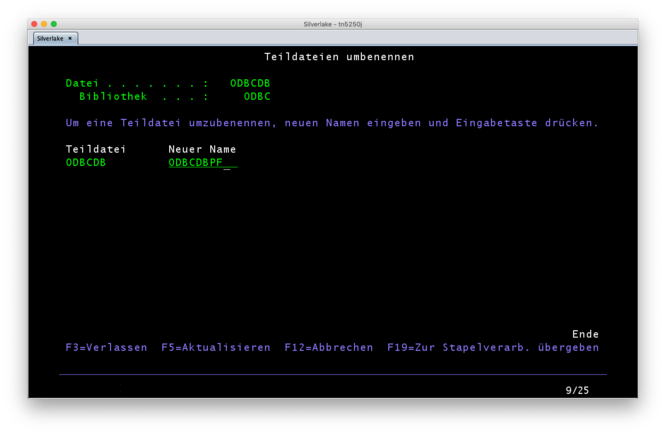
- And try again.
- Check with
DSPMSG[2] whether the compile was successful or not. If it did, you find the new PF in the library: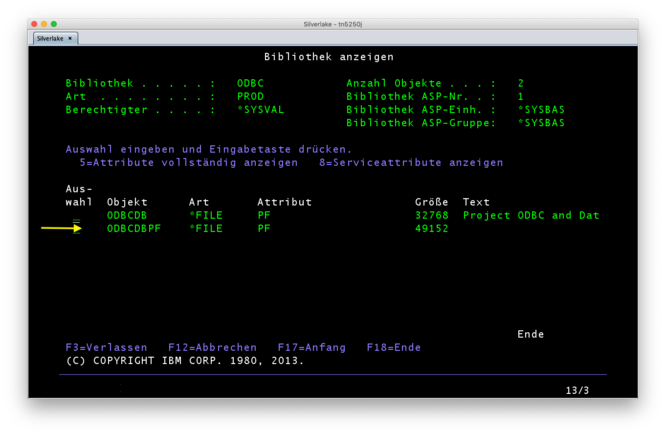
- Just rename the DDS member from
Insert content into the database
STRSQL+F4- Enter the library name, in this example
ODBC[3]
- Enter the library name, in this example
- In the interactive SQL session, enter:
INSERT INTO CALLS (CALLER, CALLED, DATE, TIME, TIMESTAMP) VALUES ('Ernie', 'Bert', '2019-10-05', '23.23', '2019-10-05 23:23:42')[4][5] - There are many ways to display the result:
- If you're still in STRSQL, enter:
SELECT * FROM CALLS - On command line, try this:
DSPF FILE(ODBC/ODBCDBPF) - Or use
STRDFU, select option 5 and fill out the displayed form.
- If you're still in STRSQL, enter:
ODBC Queries
Make sure you've set up /etc/odbc.ini correctly.
Perl
Here is a nice HowTo from IBM. Worth reading.
Script Source Code
#!/usr/bin/perl
use strict;
use DBI;
my $db_cfg="YOURCONFIG"; # See your /etc/odbc.ini
my $db_pwd="YOURUSER";
my $db_user="YOURPASSWORD";
printf("Connecting to source database on $db_cfg...\n");
my $dbh = DBI->connect('DBI:ODBC:' . $db_cfg, $db_user, $db_pwd, {PrintError => 1, AutoCommit => 1}); # Connecting to Db2 database
if ( $dbh )
{
my $sth = $dbh->prepare ("SELECT * FROM ODBC/ODBCDBPF");
if (!$sth->execute)
{
printf("Error: Preparing select on source failed.\n");
die;
}
my $fCaller;
my $fCalled;
my $fDate;
my $fTime;
my $fTS;
while ( ($fCaller, $fCalled, $fDate, $fTime, $fTS) = $sth->fetchrow ) # Read one row from source table
{
printf("%s, %s, %s, %s, %s\n", $fCaller, $fCalled, $fDate, $fTime, $fTS);
}
# Clean up last statements
$sth->finish;
# Disconnect from database
if ( $dbh )
{
print("Disconnecting from $db_cfg...\n");
$dbh->disconnect;
}
}
else
{
printf("Error: Connection to database (%s) failed:\n%s\n%s\n%s\n", $db_cfg, $DBI::err, $DBI::errstr, $DBI::state);
die;
}
Output
$ ./as400-odbc.pl Connecting to source database on YOURCONFIG... Ernie Bert 2019-10-05 23:24:00 2019-10-05 23:23:42.000000 Bob Heppo 2019-11-06 05:05:05 2019-10-05 23:23:42.000000 Disconnecting from YOURCONFIG...
PHP
I found several possible approaches:
- Use
odbc_command set - Use PDO
- Short Overview @PoC: Is this compatible???
- Use Db2 driver @PoC: Is this compatible???
- Db2 client & direct link
- Installation instructions
- Usage and after client installation:
TBD -hmight help!
PHP Code using ODBC
Let me say right away, that didn't work out as easy as I hoped.
<?php /* Sample Code: How to query a Db2 database on a AS/400 (iSeries) * Note: apt-get install php-odbc might be necessary * About: https://try-as400.pocnet.net * */ $db_cfg="YOURCONFIG"; # See your /etc/odbc.ini $db_user="YOURUSER"; $db_pwd="YOURPASSWORD"; $dbh=odbc_connect($db_cfg, $db_user, $db_pwd); if ($dbh) { $sql="SELECT * FROM ODBC/ODBCDBPF"; printf("Preparing \"$sql\"...\n"); $sth=odbc_prepare($dbh, $sql);
As you can see, the source isn't complete. That's because I wasn't able to execute it any further. Output so far:
Preparing "SELECT * FROM ODBC/ODBCDBPF"... mmap() failed: [12] Cannot allocate memory PHP Fatal error: Out of memory (allocated 2097152) (tried to allocate 206158430251 bytes)
The driver seems to need 206158430251 bytes, that's 192GB, a bit greedy for my taste.
After some research[7][8][9]I'm pretty sure, its old 32bit ODBC-drivers conflicting with 64bit PHP[10].
STAY TUNED WE ARE WORKING ON A SOLUTION.
PHP Code using DB2 client
That wasn't very smooth, either.
I first installed some software:
- Get IBM's CLI driver: https://public.dhe.ibm.com/ibmdl/export/pub/software/data/db2/drivers/odbc_cli/ and move it to /home/clidriver
- Insert this into .bashrc:
# CLI Driver (PHP -> Db2 (AS/400),
export IBM_DB_HOME=/home/clidriver
export LD_LIBRARY_PATH=${IBM_DB_HOME}/lib
export PATH=${IBM_DB_HOME}/bin:$PATH
- apt-get install php-dev
- pecl install ibm_db2
- add extension=ibm_db2.so to /etc/php/7.0/cli/php.ini
- If used with apache (untested):
- add LD_LIBRARY_PATH as shown above to httpd.conf
- add extension=ibm_db2.so to /etc/php/7.0/apache2/php.ini
- Beyond: https://www.php.net/manual/en/ibm-db2.installation.php || https://github.com/php/pecl-database-ibm_db2 || https://public.dhe.ibm.com/ibmdl/export/pub/software/data/db2/drivers/odbc_cli/
$db_user="YOURUSER"; $db_pwd="YOURPASSWORT"; $db_db = 'ODBC'; $db_hostname = 'silverlake.intern.mathpeter.com'; $db_port = 8471; //50000; /* https://www.ibm.com/support/pages/tcpip-ports-required-ibm-i-access-and-related-functions */ $db_options = array('autocommit' => DB2_AUTOCOMMIT_ON); ini_set("display_errors", 1); //$connectionString = "DRIVER={IBM DB2 ODBC DRIVER};DATABASE=$db_db;HOSTNAME=$db_hostname;PORT=$db_port;PROTOCOL=TCPIP;UID=$db_user;PWD=$db_pwd;"; // takes for ever to connect $connectionString = "DATABASE=$db_db;HOSTNAME=$db_hostname;PORT=$db_port;PROTOCOL=TCPIP;UID=$db_user;PWD=$db_pwd;"; // takes for ever to connect printf("connectionString: $connectionString\n"); $dbh=db2_connect($connectionString, NULL, NULL, $db_options); // https://www.php.net/manual/en/function.db2-connect.php
This code stalls at db2_connect(). netstat shows that the TCP-connection is ESTABLISHED. It doesn't create heavy load or traffic. It doesn't run into a timeout.
STAY TUNED - MAYBE I CAN GET THIS WORKING.
PHP Code using PDO
TBD
C
Nice to know:
- http://www.unixodbc.org
- http://www.unixodbc.org/doc/db2.html
- https://www.easysoft.com/developer/interfaces/odbc/linux.html
- https://www.easysoft.com/developer/languages/c/odbc_tutorial.html
- https://stackoverflow.com/questions/33020646/gcc-odbc-on-linux-is-not-linking
- You might need to install unixodbc-dev
C Source Code
/* File: as400-odbc.c * About: Learn more here: https://try-as400.pocnet.net */ #include <stdio.h> #include <stdlib.h> #include <sql.h> #include <sqlext.h> #include <string.h> #define RESULT_LEN 256 char *odbcConnectionString = "DSN=YOURCONFIG;UID=YOURLOGIN;PWD=YOURPASSWORD;"; // See /etc/odbc.ini for DSN, use your AS/400 account as credentials. #define CHECK_ERROR(e, s, h, t)\ (\ {\ if (e!=SQL_SUCCESS && e != SQL_SUCCESS_WITH_INFO)\ { extract_error(s, h, t); goto exit;}\ }\ ) void extract_error(char *fn, SQLHANDLE handle, SQLSMALLINT type) { SQLINTEGER i = 0; SQLINTEGER NativeError; SQLCHAR SQLState[7]; SQLCHAR MessageText[256]; SQLSMALLINT TextLength; SQLRETURN ret; fprintf(stderr, "\nThe driver reported the following error %s\n", fn); do { ret = SQLGetDiagRec(type, handle, ++i, SQLState, &NativeError, MessageText, sizeof(MessageText), &TextLength); if (SQL_SUCCEEDED(ret)) { printf("%s:%ld:%ld:%s\n", SQLState, (long)i, (long)NativeError, MessageText); } } while (ret == SQL_SUCCESS); } int main() { SQLHENV henv = SQL_NULL_HENV; // Environment SQLHDBC hdbc = SQL_NULL_HDBC; // Connection handle SQLHSTMT hstmt = SQL_NULL_HSTMT; // Statement handle SQLRETURN retcode; SQLCHAR fCaller[RESULT_LEN]; SQLCHAR fCalled[RESULT_LEN]; SQLCHAR fDate[RESULT_LEN]; SQLCHAR fTime[RESULT_LEN]; SQLCHAR fTS[RESULT_LEN]; SQLCHAR outstr[1024]; SQLSMALLINT outstrlen; int i = 0; // Allocate environment handle retcode = SQLAllocHandle(SQL_HANDLE_ENV, SQL_NULL_HANDLE, &henv); CHECK_ERROR(retcode, "SQLAllocHandle(SQL_HANDLE_ENV)", henv, SQL_HANDLE_ENV); // Set the ODBC version environment attribute retcode = SQLSetEnvAttr(henv, SQL_ATTR_ODBC_VERSION, (SQLPOINTER*)SQL_OV_ODBC3, 0); CHECK_ERROR(retcode, "SQLSetEnvAttr(SQL_ATTR_ODBC_VERSION)", henv, SQL_HANDLE_ENV); retcode = SQLSetEnvAttr(henv, SQL_ATTR_ODBC_VERSION, (SQLPOINTER*)SQL_OV_ODBC3, 0); CHECK_ERROR(retcode, "SQLSetEnvAttr(SQL_ATTR_ODBC_VERSION)", henv, SQL_HANDLE_ENV); // Allocate connection handle retcode = SQLAllocHandle(SQL_HANDLE_DBC, henv, &hdbc); CHECK_ERROR(retcode, "SQLAllocHandle(SQL_HANDLE_DBC)", hdbc, SQL_HANDLE_DBC); // Set login timeout to 5 seconds SQLSetConnectAttr(hdbc, SQL_LOGIN_TIMEOUT, (SQLPOINTER)5, 0); CHECK_ERROR(retcode, "SQLSetConnectAttr(SQL_LOGIN_TIMEOUT)", hdbc, SQL_HANDLE_DBC); // Connect to data source, replace with your connection string retcode = SQLDriverConnect(hdbc, NULL, odbcConnectionString, SQL_NTS, outstr, sizeof(outstr), &outstrlen, SQL_DRIVER_NOPROMPT); // Allocate statement handle retcode = SQLAllocHandle(SQL_HANDLE_STMT, hdbc, &hstmt); CHECK_ERROR(retcode, "SQLAllocHandle(SQL_HANDLE_STMT)", hstmt, SQL_HANDLE_STMT); // Execute SQL Query retcode = SQLExecDirect(hstmt, (SQLCHAR*) "SELECT * FROM ODBC/ODBCDBPF", SQL_NTS); CHECK_ERROR(retcode, "SQLExecDirect()", hstmt, SQL_HANDLE_STMT); // Bind columns retcode = SQLBindCol(hstmt, 1, SQL_C_CHAR, &fCaller, RESULT_LEN, 0); retcode = SQLBindCol(hstmt, 2, SQL_C_CHAR, &fCalled, RESULT_LEN, 0); retcode = SQLBindCol(hstmt, 3, SQL_C_CHAR, &fDate, RESULT_LEN, 0); retcode = SQLBindCol(hstmt, 4, SQL_C_CHAR, &fTime, RESULT_LEN, 0); retcode = SQLBindCol(hstmt, 5, SQL_C_CHAR, &fTS, RESULT_LEN, 0); // Fetch and print each row of data until SQL_NO_DATA returned. for (i = 0; ; i++) { retcode = SQLFetch(hstmt); if (retcode == SQL_SUCCESS || retcode == SQL_SUCCESS_WITH_INFO) { printf("Row %d: %s\t%s\t%s\t%s\t%s\n", i, fCaller, fCalled, fDate, fTime, fTS); } else { if (retcode != SQL_NO_DATA) { CHECK_ERROR(retcode, "SQLFetch()", hstmt, SQL_HANDLE_STMT); } else { break; } } } exit: // // Free handles // // Statement if (hstmt != SQL_NULL_HSTMT) { SQLFreeHandle(SQL_HANDLE_STMT, hstmt); } // Connection if (hdbc != SQL_NULL_HDBC) { SQLDisconnect(hdbc); SQLFreeHandle(SQL_HANDLE_DBC, hdbc); } // Environment if (henv != SQL_NULL_HENV) { SQLFreeHandle(SQL_HANDLE_ENV, henv); } return 0; }
Compiling
#!/bin/bash clear gcc as400-odbc.c -o as400-odbc_c -lodbc
Note the -lodbc for linking against the ODBC-libraries.
Output
$./as400-odbc_c Row 0: Ernie Bert 2019-10-05 23:24:00 2019-10-05 23:23:42.000000 Row 1: Bob Heppo 2019-11-06 05:05:05 2019-10-05 23:23:42.000000 $
\o/
Articles to maintain
- Basic Software Development
- Editing Source Files using Eclipse and FTP
- Compile Sources Without Queuing
Sandbox
Screen mit MW-Bordmitteln
Anmelden
System . . . . . : SLVRLAKE
Subsystem . . . . : QINTER
Bildschirm . . . : QPADEV0004
Benutzer . . . . . . . . . . . .
Kennwort . . . . . . . . . . . .
Programm/Prozedur . . . . . . . .
Men} . . . . . . . . . . . . . .
Aktuelle Bibliothek . . . . . . .
(C) COPYRIGHT IBM CORP. 1980, 2013.
Und nun Screen mit Bordmitteln und etwas HTML-Foo
Anmelden
System . . . . . : SLVRLAKE
Subsystem . . . . : QINTER
Bildschirm . . . : QPADEV0004
Benutzer . . . . . . . . . . . .
Kennwort . . . . . . . . . . . .
Programm/Prozedur . . . . . . . .
Men} . . . . . . . . . . . . . .
Aktuelle Bibliothek . . . . . . .
(C) COPYRIGHT IBM CORP. 1980, 2013.
Using (not-working) console-tag
<console> Test </console>
<console>
Anmelden
System . . . . . : SLVRLAKE
Subsystem . . . . : QINTER
Bildschirm . . . : QPADEV0004
Benutzer . . . . . . . . . . . .
Kennwort . . . . . . . . . . . .
Programm/Prozedur . . . . . . . .
Men} . . . . . . . . . . . . . .
Aktuelle Bibliothek . . . . . . .
(C) COPYRIGHT IBM CORP. 1980, 2013.
</console>
- Links
- References:
- ↑ Heiko made this pretty brief, f.e. not every
F3or⏎is noted. - ↑ or use Compile Sources Without Queuing
- ↑ Shortcut:
STRSQL LIBOPT(ODBC) - ↑ Timestamp format: https://www.ibm.com/support/knowledgecenter/SSFMBX/com.ibm.swg.im.dashdb.sql.ref.doc/doc/r0007107.html
- ↑ You can use either
.or:as delimiter in time fields. The proper way, according to the documentation I found, is:. - ↑ Sadly this is for mySQL. Db2 would be much more appreciated.
- ↑ php-mmap-issue: https://stackoverflow.com/questions/42132558/odbc-prepare-gives-fatal-error-allowed-memory-size-exhausted
- ↑ php-mmap-issue: https://stackoverflow.com/questions/21286589/linux-odbc-fatal-error-allowed-memory-size/21412667#21412667
- ↑ unixodbc-32/64bit drivers: http://www.unixodbc.org/doc/db2.html
- ↑ Oddly, the same drivers work with perl
